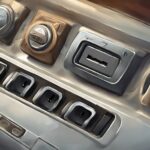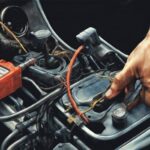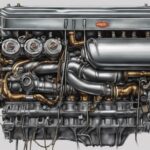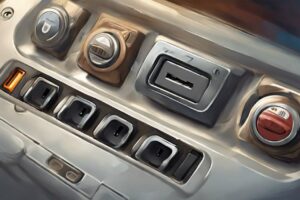The check engine light is a warning signal that appears on the dashboard of a car when there is an issue with the engine or emissions system.
It can indicate a range of problems, from minor issues like a loose gas cap to more serious problems like a malfunctioning catalytic converter.
But can the check engine light turn off by itself? The simple answer is that it depends on the underlying issue.
In some cases, the light may turn off after a certain number of successful drive cycles, but in other cases, the problem may persist and require professional attention.
So it’s important to understand the reasons why the check engine light may turn off by itself and the potential risks of ignoring it.
In this article, we’ll explore the reasons why the check engine light may turn off on its own, including common causes and what you can do to help prevent it from coming back on.
Can the Check Engine Light Turn Itself Off?
Yes, a check engine light can turn off by itself in certain circumstances.
The check engine light is designed to come on when there’s a problem with the engine or emissions system, and it’s a signal that there’s something that needs to be addressed.
Once the issue has been fixed, the check engine light should turn off on its own.
If the problem that triggered the light was only temporary, such as a loose gas cap or a temporarily high emissions reading, the light may turn off on its own after some time and driving.
Here are some examples of cases where the check engine light can turn off on its own:
| Event | Description | Check Engine Light Behavior |
|---|---|---|
| Low Fuel Level | When the fuel level is low, the fuel system may detect a problem and trigger the check engine light. | The check engine light may turn off on its own after refueling the vehicle and the system detects no further issues. |
| Cold Weather | In extremely cold weather, the engine may have trouble starting or running efficiently, triggering the check engine light. | The check engine light may turn off on its own after the engine has warmed up and the system detects no further issues. |
| Faulty Battery | A weak or faulty battery can cause the engine to run poorly and trigger the check engine light. | The check engine light may turn off on its own after the battery is charged or replaced and the system detects no further issues. |
| Faulty Sensor | A faulty sensor, such as the mass airflow sensor or throttle position sensor, can cause the engine to run poorly and trigger the check engine light. | The check engine light may turn off on its own after the sensor is replaced and the system detects no further issues. |
| Faulty Ignition Coil | A faulty ignition coil can cause the engine to misfire and trigger the check engine light. | The check engine light may turn off on its own after the ignition coil is replaced and the system detects no further issues. |
| Clogged Air Filter | A clogged air filter can cause the engine to run inefficiently and trigger the check engine light. | The check engine light may turn off on its own after the air filter is replaced and the system detects no further issues. |
| Faulty Gas Pedal Sensor | A faulty gas pedal sensor can cause the engine to run poorly and trigger the check engine light. | The check engine light may turn off on its own after the sensor is replaced and the system detects no further issues. |
| Temporary High Emissions | Temporary high emissions can occur due to a variety of factors, such as a malfunctioning catalytic converter or oxygen sensor. | The check engine light may turn off on its own after a few driving cycles if the issue resolves itself and the system detects no further issues. |
It is important to note that even if the check engine light turns off on its own, the problem that triggered it may still exist.
I’d recommend that you carry out a diagnostic readout of any error codes that may be stored in the ECU and clear them from memory, or have the vehicle checked by a mechanic to ensure that there are no underlying issues.
Most vehicles have a self-diagnostic system that runs each time the car is started. If a simple problem has been resolved, the light may disappear from the dashboard.
However, if the problem persists or is more serious, the light will come back on after driving for a few minutes until the issue is fixed.
How Does The Check Engine Light Work?
The check engine light is a warning light on the dashboard of a vehicle that’s designed to alert you to a problem with the engine or one of the various systems in your vehicle.
When the check engine light comes on, it’s basically an indicator that there’s an issue that needs to be addressed.
The check engine light is controlled by the engine control unit (ECU), which is the computer that manages the engine’s performance.
The ECU is constantly monitoring the various sensors and systems in the engine to ensure that everything is functioning properly.
When the ECU detects a problem with the engine or for example, the emissions system, it will trigger the check engine light to come on.
The check engine light may come on immediately if the issue is serious, or it may take some time to come on if the issue is minor or intermittent.
Depending on the severity of the issue, it may flash or stay a solid light that can be yellow or red.
Once the check engine light is on, it will usually stay on until the issue is resolved.
The best way to find out the cause of the problem is to use a diagnostic tool to read the diagnostic error code that triggered the check engine light, which can provide more information about the specific issue that needs to be addressed.
Once the issue has been resolved, the check engine light can be reset or it will turn off on its own after driving the vehicle for a few minutes. If the issue is not resolved, the check engine light will remain on until the problem is fixed.
There are many issues that can trigger the check engine light. Some of the most common issues include:
| Cause of Check Engine Light | Description of Cause | Severity of Problem |
|---|---|---|
| Loose or damaged gas cap | A loose or damaged gas cap can cause fuel vapors to escape from the fuel tank, which can trigger the check engine light. | Minor |
| Faulty oxygen sensor | The oxygen sensor measures the amount of oxygen in the exhaust system and sends a signal to the engine control unit.
A faulty oxygen sensor can cause the engine to run rich or lean, which can trigger the check engine light. |
Minor to Moderate |
| Malfunctioning catalytic converter | The catalytic converter is responsible for converting harmful emissions into less harmful gases.
A malfunctioning catalytic converter can cause increased emissions and trigger the check engine light. |
Moderate to Severe |
| Bad spark plugs or wires | Spark plugs and wires are responsible for igniting the fuel in the engine.
Bad spark plugs or wires can cause the engine to misfire, which can trigger the check engine light. |
Moderate |
| Failed mass airflow sensor | The mass airflow sensor measures the amount of air entering the engine and sends a signal to the engine control unit.
A failed mass airflow sensor can cause the engine to run rich or lean, which can trigger the check engine light. |
Minor to Moderate |
| Faulty ignition coil | The ignition coil is responsible for providing the spark that ignites the fuel in the engine.
A faulty ignition coil can cause the engine to misfire, which can trigger the check engine light. |
Moderate |
| Dirty or clogged air filter | The air filter is responsible for filtering out dirt and debris from the air entering the engine.
A dirty or clogged air filter can cause the engine to run rich, which can trigger the check engine light. |
Minor |
| Failed vacuum hose | Vacuum hoses are responsible for controlling various systems in the engine, such as the brakes and transmission.
A failed vacuum hose can cause these systems to malfunction, which can trigger the check engine light. |
Minor to Moderate |
The severity of the problem can vary depending on the specific circumstances and the make and model of the vehicle.
If you aren’t familiar with how to repair your specific vehicle then it’s always best to have the issue diagnosed and repaired by a qualified mechanic to ensure that the vehicle is running properly and to prevent further damage to the engine or emissions system.
Why Does the Check Engine Light Go On And Off On Its Own?
Several factors can affect whether the check engine light will go off on its own. The severity of the issue, the type of vehicle, and how the vehicle is driven can all play a role.
Minor issues, such as a loose gas cap or a faulty sensor, may cause the check engine light to turn on but can often be resolved quickly and easily. In some cases, the light may turn off on its own once the issue is resolved.
However, more serious issues, such as a malfunctioning catalytic converter or a misfiring engine, may require more extensive repairs and will not go away on their own.
In these cases, it is important to address the issue promptly to avoid further damage to the vehicle.
Minor vs Serious Issues
It’s crucial to understand that not all check engine light issues are the same. Some problems are minor and can be quickly resolved, while others are more severe and demand extensive repairs.
In general, if the check engine light is flashing, it indicates a critical issue that needs immediate attention.
A flashing check engine light may mean that the engine is misfiring, which can potentially harm the vehicle if not addressed promptly.
Conversely, if the check engine light is steady, it suggests a less serious problem that can be dealt with at a later time.
However, it’s still important to address the issue as soon as possible to prevent further vehicle damage and ensure efficient operation.
Whether the check engine light will turn off by itself depends on various factors such as the issue’s severity, the vehicle type, and driving conditions.
While minor problems might resolve over time, more significant issues necessitate swift action to prevent additional harm to the vehicle.
What to Do When the Check Engine Light Turns On
When the Check Engine Light turns on, it’s important to take certain steps to address the issue effectively.
Here’s what you should do:
- Don’t panic: While the Check Engine Light can be unsettling, try to remain calm and avoid jumping to conclusions about the severity of the problem. It can indicate various issues, ranging from minor to more significant concerns.
- Check for obvious problems: Take a moment to inspect your vehicle for any apparent issues such as a loose gas cap or frayed wires. Sometimes, a loose gas cap can trigger the Check Engine Light.
If you find any visible problems, address them accordingly.
- Evaluate the light’s behavior: Take note of how the Check Engine Light is behaving. Is it flashing or steady?
A flashing light typically indicates a more severe problem that requires immediate attention, while a steady light suggests a less urgent issue. This information will be helpful when communicating with a mechanic.
- Consider a diagnostic tool: If you have access to an OBD-II (On-Board Diagnostic) scanner, you can use it to retrieve the diagnostic trouble codes (DTCs) associated with the Check Engine Light.
These codes provide specific information about the problem and can guide you in understanding the underlying issue. If you’re not comfortable using a scanner, it’s best to consult a professional mechanic.
- Seek professional assistance: It’s advisable to consult a qualified mechanic or visit an auto repair shop to diagnose and resolve the problem.
They have the necessary tools and expertise to accurately identify the issue triggering the Check Engine Light. Avoid ignoring the light or attempting DIY fixes unless you have the relevant knowledge and experience.
- Follow the recommended repairs: Once the problem has been diagnosed, the mechanic will explain the necessary repairs or adjustments needed to resolve the issue.
It’s essential to follow their recommendations and address the problem promptly to prevent potential damage and maintain the vehicle’s performance.
Remember, the Check Engine Light serves as an early warning system to alert you to potential issues with your vehicle.
By responding promptly and seeking professional assistance, you can ensure the problem is properly diagnosed and resolved, promoting the overall health and reliability of your vehicle.
Importance of Addressing the Issue Promptly
Addressing the issue promptly is crucial to prevent further damage and costly repairs. A malfunctioning emissions system can cause a car to fail an emissions test, resulting in fines or penalties.
In addition, a car with a malfunctioning emissions system may produce harmful pollutants that can damage the environment.
In some cases, a malfunctioning internal function can lead to more serious problems such as engine failure. This can result in costly repairs or even the need to replace the entire engine.
Addressing the issue promptly can prevent these more serious problems from occurring.
In conclusion, when the check engine light turns on, it is important to take the necessary steps to address the issue promptly.
Checking the gas cap, seeking professional diagnosis and repair, and addressing the issue promptly can prevent further damage and costly repairs.
FAQs
1. Can a check engine light go on and off for no reason?
While it is rare for a Check Engine Light to go on and off for no reason, there can be instances where it may appear sporadically.
There are a few factors that can contribute to this behavior:
-Intermittent issues: Some vehicle problems may occur intermittently, causing the Check Engine Light to turn on and off.
For example, a faulty sensor or a loose connection may result in sporadic signals to the engine control unit, triggering the light at irregular intervals.
-Sensor glitches: Occasionally, sensors responsible for monitoring various components of the vehicle can experience temporary glitches or false readings.
This can lead to the Check Engine Light illuminating momentarily and then turning off on its own.
-Transient conditions: Certain environmental or driving conditions can temporarily trigger the Check Engine Light.
For instance, extreme temperatures, changes in altitude, or driving through rough terrain can cause momentary fluctuations in engine performance, resulting in the light coming on briefly before resolving itself.
-Residual codes: In some cases, even after an issue has been resolved, the Check Engine Light may remain on for a few driving cycles before turning off.
This can occur due to the vehicle’s diagnostic system taking time to reevaluate and confirm that the problem has been effectively resolved.
2. Why is my check engine light on but my car runs fine?
The check engine light may be on even if your car runs fine due to reasons such malfunctioning sensors, minor problems like a loose gas cap, or pending codes that can trigger the light without immediate impact on the car’s performance.
Temporary glitches or false readings can also cause the light to come on temporarily.
It’s important not to ignore the check engine light and have your vehicle inspected by a mechanic to identify the underlying cause, as even seemingly minor issues should be addressed promptly to prevent potential complications.











